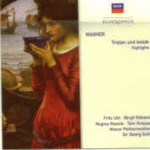This is a stumper: If you had a 46-year-old recording of a great Isolde in her prime and in one of her greatest roles, in a recording that got strangely short shrift when it was initially released, and you had 71 minutes’ worth of music with which to stuff a highlights CD, would you include the entire prelude and all of King Marke’s monologue? Well, this set presents, in addition to the prelude and Marke’s spiel, the six minutes prior to the first meeting between Tristan and Isolde, most of the love duet from “O sink herneider” to the end, with a big cut in the middle, and the last 15 minutes of the opera, including, happily, the Liebestod. No Narrative and Curse; no opening to Act 2. We also get six-or-so minutes of rehearsal with Solti and John Culshaw discussing the placement of Brangaene’s voice in her Act 2 warning. Nilsson is exciting–what we get of her; Fritz Uhl is a beefy Tristan; Arnold van Mill’s Marke is a bore. Forget this.
































